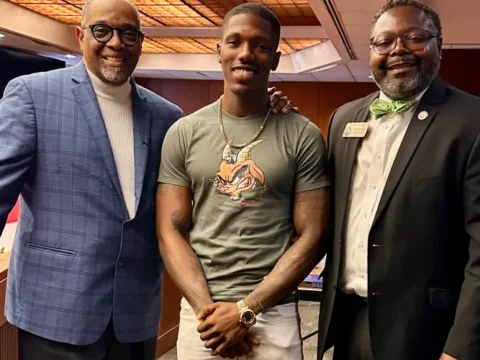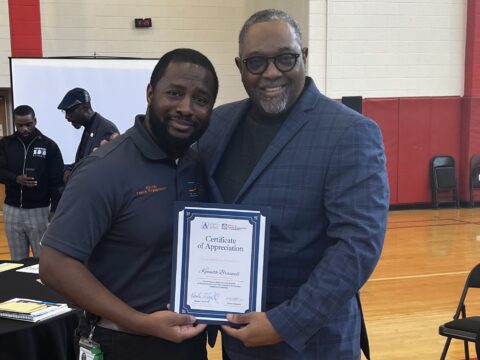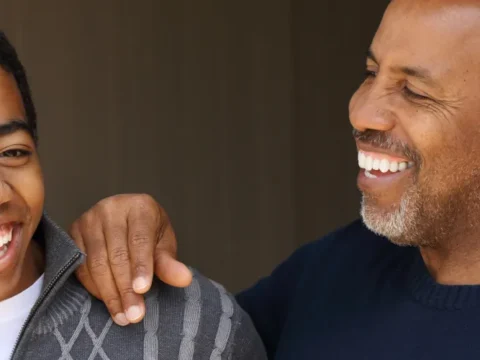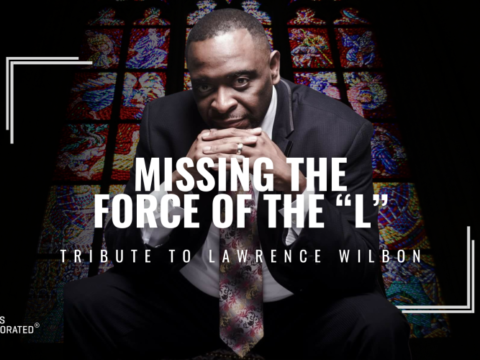By Kenneth Braswell, CEO, Fathers Incorporated
I’ve learned something sobering on this long road called success: the higher you climb, the smaller your circle becomes — not because you’ve changed, but because success has a way of unsettling the familiar.
The irony is that most of us begin our journeys surrounded by people who say they believe in us. They clap for our first steps, like proud parents watching a toddler wobble forward. But once the steps turn into strides, once the vision begins to manifest and the calling starts to look like confirmation — something shifts. Cheers fade into silence, and applause turns into side-eyes. Suddenly, the same people who prayed for your rise start whispering about your reach.
And that’s when it hits you: Sometimes, people are more comfortable with your potential than your progress.
Success is strange that way. It exposes people. It has a quiet way of shaking loose the truth about who’s really for you and who’s only for the version of you that made them feel comfortable.
When you’re struggling, folks know where to find you. They know how to speak to you. They know how to advise you, encourage you, and even correct you. But when you begin to win — when you start walking in your assignment with grace and authority — it disrupts something. Your consistency calls out their complacency. Your movement reminds them of their stillness. And without meaning to, your growth becomes a mirror they can’t look into for too long.
That’s the hidden cost of success nobody talks about. Not the money. Not the meetings. Not the long nights or early mornings. The cost is connection, the subtle drift between you and the people who once felt like home.
I’ve come to understand that people aren’t always jealous of your success. They’re uncomfortable with how your success changes their place in your story. Some need you to remain struggling so they can remain necessary. Some loved you best when you needed saving. And some were never rooting for you; they were rooting for what your light could reflect on them.
So when the light turns inward — when you start shining on your own — they step back, squinting, unsure whether to celebrate or complain.
I’ve seen it happen in friendships, partnerships, and collaborations, any spaces where people use words like “family” but apply them situationally. When the partnership profits, the love flows freely. But when the tide shifts, when your blessing doesn’t seem to spill into their lap, they start to look at you differently.
They forget that the purpose of partnership is not ownership. The purpose of family is not convenience. And the purpose of friendship is not proximity — it’s authenticity.
Social media makes this more complicated. It tricks us into thinking we’re connected when, in truth, we’re performing. We scroll through highlight reels and call them lives. We count likes as affirmation and unfollows as betrayal.
I’ve noticed how silence can be louder than applause. How an unreturned call, an unacknowledged achievement, a missing tag, or a quiet unfollow can tell you more about a person than their last “I’m proud of you.”
You start realizing who’s rooting for your success and who’s just watching it and waiting for it to falter. You start noticing how some people don’t clap unless they’re in the photo, how others cheer in public but compete in private.
And yet, even with all that awareness, there’s still a sting. Success doesn’t numb you. It heightens you. You feel everything more deeply. You hear the silence. You sense the distance. You see the betrayal before it’s spoken. And sometimes, you sit in the quiet of your own victories, wondering why joy feels so lonely.
The older I get — the more seasoned I become — the more I realize that success doesn’t isolate you; clarity does. Once your eyes open to the truth, you can’t unsee it. Once you understand that not everyone clapping is a fan, not everyone listening is learning, and not everyone near you is with you, you start to cherish solitude as safety.
It’s in that solitude that God does His best work. He removes distractions disguised as relationships. He untangles your roots from soil that can no longer nourish you. He reminds you that being chosen often means being set apart.
I used to wrestle with that word — chosen because it sounds glamorous until you live it. To be chosen means to be misunderstood. It means you’ll often have to walk alone. It means you’ll be talked about by people who used to walk beside you. It means your obedience will offend those who only saw you through the lens of your struggle.
But if you are rooted — if you’ve done the work to connect to your purpose at the root level — you stop chasing validation. You stop trying to explain the favor of God to people who haven’t experienced it. You stop apologizing for growing.
I’ve always said that struggle is what makes you strong. The valleys taught me more than the peaks ever could. The lessons learned in the dark are the same ones that allow me to shine without shame. Every low moment builds muscle. Every setback refines my character. Every unanswered prayer positions me for the blessing I didn’t even know to ask for.
So when I speak of my success, it isn’t out of arrogance. It’s out of gratitude. It’s my way of saying thank you to a God who kept me when I couldn’t keep myself. It’s an expression of humility, not hubris, because I know where I came from. I know what I’ve survived. I know what almost broke me.
And so, yes, I speak it out loud. I post it. I celebrate it. Because gratitude isn’t meant to be hidden. When I share my success, I’m not saying, “Look at me.” I’m saying, “Look at what faith can do.”
Still, I’ve noticed how even gratitude can be misread. People will call it bragging. They’ll twist testimony into self-promotion. They’ll measure your thankfulness against their insecurity.
But I’ve stopped explaining myself. I’ve stopped trying to make others comfortable with what God is doing in my life. I’ve learned that when you dim your light to make others feel less exposed, you both end up in the dark.
The truth is, people love your story until it outgrows their chapter. They love your comeback until it starts to look like consistency. Familiarity gives them comfort. They know what to expect from the “old you,” but the “elevated you” introduces uncertainty. They can’t place you anymore, and what they can’t place, they often reject.
That’s why failure is often more desirable than success — to others, not to you. Your failures make you relatable. They keep you in the circle of shared struggle. They give people something to talk about that doesn’t require them to confront their own inaction.
But success — your continued obedience, your sustained focus — asks something of them. It asks them to reflect. It asks them to grow. And that’s not a question everyone’s ready to answer.
I often think about the saying, “It’s lonely at the top.” What people miss is that it’s not lonely because of altitude but because of attitude. The higher you rise, the thinner the air of authenticity becomes. You can’t breathe the same in rooms built on ego, jealousy, and competition. You start craving sincerity the way lungs crave oxygen.
And yet, in that loneliness, there’s a strange kind of peace. You learn to value silence not as an absence, but as a presence of clarity, purpose, and divine direction. You begin to see loneliness as a season, not a sentence.
There’s a sacred quiet that comes with being in alignment. It’s not isolation; it’s insulation. God doesn’t remove people to punish you. He removes them to protect you. Not everyone can handle proximity to purpose. Some will drain it. Some will distort it. Some will disguise themselves as allies while silently hoping you fail.
So, when the familiar starts to fall away, don’t mourn it too long. That shedding is necessary. That pruning is preparation: What’s coming next requires roots deep enough to sustain fruit that others can’t see yet.
Sometimes, success will make you question yourself. You’ll wonder if you’ve become too distant, too guarded, too cautious. You’ll miss the ease of old relationships and the simplicity of conversations that didn’t require translation. But you’ll also remember the cost, the times your openness was weaponized, your generosity was taken for granted, and your achievements met with silence.
And you’ll remind yourself that peace is expensive but worth the price.
What I know for sure is that when your purpose is clear, your company changes. You attract differently. You align differently. You discern differently. And though that clarity may shrink your circle, it expands your capacity.
You begin to measure relationships not by how long they’ve lasted, but by how deeply they respect your purpose. You stop chasing “family vibes” in spaces that operate on transactions. You stop confusing collaboration for covenant.
I often say the greatest confirmation of God’s hand on your life isn’t applause — it’s opposition because the enemy doesn’t fight what isn’t a threat. The friction you feel on the road of success is proof that you’re moving.
So when people withdraw, misunderstand, mislabel, or mistreat you, don’t take it as rejection. God is showing you what’s real. He’s teaching you to discern the difference between familiar and faithful.
And in those moments when it feels heavy — when you sit in your quiet office, scrolling through your own timeline, wondering who’s genuinely happy for you — pause and remember you’re not alone. Every person walking in purpose has walked through that same valley of perception. Every person anointed to lead has tasted the bitterness of being misread.
Real success isn’t measured by who claps for you but by who you remain when the clapping stops.
So to the one reading this who feels the ache of that loneliness, who wonders why success seems to separate instead of gather, hear me: You’re not broken; you’re becoming. You’re being refined, not rejected. You’re learning that divine purpose comes with divine protection, which sometimes looks like people walking away.
Stay grateful. Stay grounded. Stay gentle. Keep doing the work. Keep showing up with integrity. Keep honoring your calling because your consistency will outlast their commentary.
And when it gets quiet, when you start missing the noise, take it to prayer. God hears the silence, too. He knows what it costs you to stay focused. He knows the tears that never make it to your timeline. And He’s still writing your next chapter while the world debates your last one.
The truth is, I no longer chase being understood. I chase being aligned. Alignment with purpose. Alignment with peace. Alignment with God. And when you’re aligned, even loneliness feels like a sanctuary.
So yes, it’s lonely at the top, but only if you define “top” by how many people stand with you. I define it by how close I stand to my purpose. And if that means standing alone for a season, so be it, because I’d rather be lonely in truth than crowded in illusion.
















